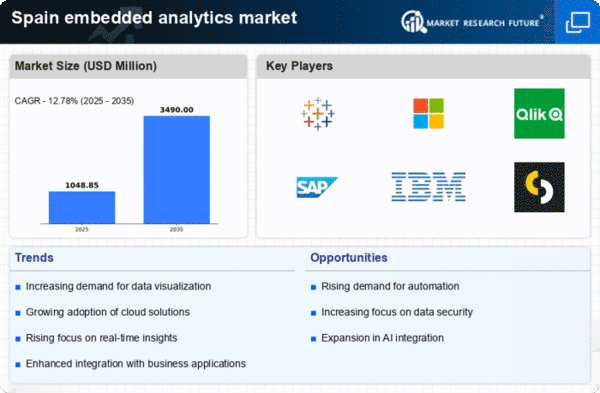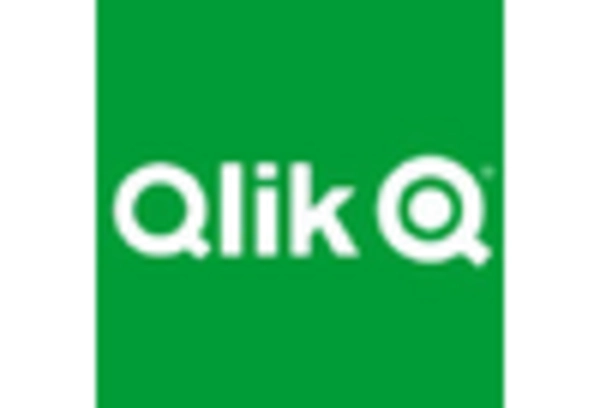Integration of Advanced Technologies
The integration of advanced technologies such as artificial intelligence (AI) and machine learning (ML) is transforming the embedded analytics market in Spain. These technologies enable organizations to derive deeper insights from their data, automate processes, and enhance predictive analytics capabilities. As of November 2025, it is estimated that approximately 30% of companies in Spain are utilizing AI-driven analytics solutions. This trend indicates a shift towards more sophisticated analytics tools that can provide actionable insights in real-time. The growing reliance on AI and ML is likely to drive further innovation within the embedded analytics market, as businesses seek to harness the power of these technologies to gain a competitive edge.
Growing Importance of Customer Experience
The embedded analytics market in Spain is also being propelled by the growing importance of customer experience. Companies are increasingly recognizing that personalized and data-driven interactions can significantly enhance customer satisfaction and loyalty. As a result, there is a rising trend towards embedding analytics within customer-facing applications to provide insights that inform marketing strategies and product development. Recent surveys indicate that organizations that leverage embedded analytics to improve customer experience report a 20% increase in customer retention rates. This trend suggests that the embedded analytics market will continue to thrive as businesses prioritize customer-centric approaches.
Regulatory Compliance and Data Governance
In Spain, the embedded analytics market is being shaped by the increasing emphasis on regulatory compliance and data governance. Organizations are required to adhere to stringent data protection regulations, such as the General Data Protection Regulation (GDPR). This necessitates the implementation of robust analytics solutions that not only provide insights but also ensure data security and compliance. As businesses strive to meet these regulatory demands, The embedded analytics market is likely to see a rise in demand for tools that offer secure data handling and reporting capabilities. This focus on compliance is expected to drive innovation and investment in analytics solutions that align with legal requirements.
Advancements in Cloud Computing Technologies
The evolution of cloud computing technologies is significantly influencing the embedded analytics market in Spain. With the increasing adoption of cloud-based solutions, organizations are able to access powerful analytics tools without the need for extensive on-premises infrastructure. This shift not only reduces costs but also enhances scalability and flexibility. As of November 2025, it is estimated that over 60% of businesses in Spain utilize cloud services, which facilitates the integration of embedded analytics into their workflows. The ability to analyze data in real-time and share insights across teams is becoming a critical factor for success, thereby driving the growth of the embedded analytics market in the region.
Rising Demand for Data-Driven Decision Making
The embedded analytics market in Spain is experiencing a notable surge due to the increasing demand for data-driven decision making across various sectors. Organizations are recognizing the value of integrating analytics directly into their applications to enhance operational efficiency and strategic planning. According to recent estimates, the market is projected to grow at a CAGR of approximately 15% over the next five years. This growth is largely attributed to businesses seeking to leverage real-time data insights to improve customer experiences and streamline processes. As companies in Spain prioritize data analytics, the embedded analytics market is likely to expand, providing tools that facilitate better decision-making and foster a culture of data literacy within organizations.
















